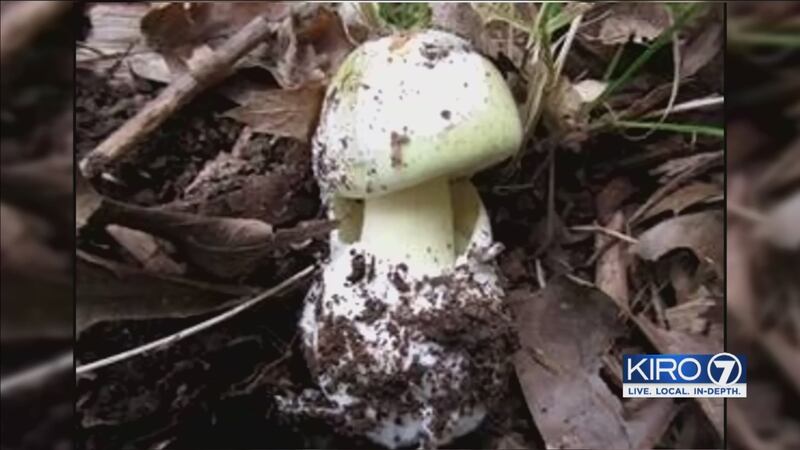The University of Washington wrote an alert Wednesday warning people that highly toxic "death cap" mushrooms were found on the Seattle campus.
The death cap mushrooms -- called Amanita phalloides -- appear similar to edible mushrooms. The poisionous mushrooms were found by UW staff.
"If a person eats a mushroom containing amanita toxins, the health effects may include liver failure, kidney failure and death," the UW alert read. "Symptoms include nausea, stomach cramps, pain and diarrhea. The onset of symptoms may be delayed by six to 24 hours after consumption."
Students say they were surprised to get the notice but that it makes sense.
"Especially I think with Seattle culture, I think a lot of people would just be willing to pick it off the ground and maybe try it. Maybe not a lot, but at least a couple of people would be willing. And just in case that happens, put out a warning," said Kirk Nguyen, a UW student.
The Puget Sound Mycological Society says foraging for mushrooms is growing in popularity.
Right now, it's peak mushroom season in the PNW.
While there are many delicious wild mushrooms to be found - porcinis, chanterelles, lobster mushrooms - there are deadly dangerous ones too.
The one that spurred UW to send out a warning - Amanita phalloides - or death cap, gets its name for a reason
"This one amanita is single handedly responsible for about 80 percent of the serious poisonings and deaths in North America. So just taking the time to learning this one mushroom goes a long way," said Danny Miller, who is with PSMS. He's also the point person with King County Poison Control. When someone gets sick and calls 911 with suspected mushroom poisoning, Miller is the one dispatch calls.
He says symptoms of eating a death cap are delayed - from six hours, to days.
"Shuts your kidneys and your liver down. So you start feeling very sick, there's usually this honeymoon phase where you think you're getting better, then it takes a bad turn again, from which you might not recover," Miller said.
The UW said a gardener found about forty death cap mushrooms on the south side of campus.
UW staff advised that anyone experiencing the symptoms get medical help immediately. They also asked that anyone that finds a suspected toxic mushroom contact UW facilities at 206-685-1900.
More news from KIRO 7
- Former Seahawks highlight Seattle Dragons' picks on Day 1 of XFL Draft
- Hunter finds skull on Whidbey Island belonging to man reported missing in 2000
- One killed, 1 critically injured in head-on collision in Preston
- DC sniper Lee Boyd Malvo's lawyers argue for new sentence before Supreme Court
- Do you have an investigative story tip? Send us an email at investigate@kiro7.com
Cox Media Group








